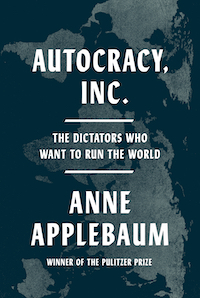Public ideas
Anne Applebaum on the very model of a modern authoritarian

Forget about jackboots, fascist or communist ideologies. Rather, think of opportunistic alliances of strongmen authoritarians, whose interests in securing their own regimes override any ideological identification – other, perhaps, than opposition to liberal secular democracy.
That’s how Anne Appelbaum, in an ABC interview, describes the way authoritarians come together in unlikely alliances: How modern dictators operate differently. They come together “not through ideals, but through deals”. That’s how we find alliances between hard “right” authoritarians such as Hungary’s Viktor Orbán and nominally “left” authoritarians such as Venezuela’s Nicholás Maduro.
Applebaum is author of Autocracy Inc.: The Dictators Who Want to Rule the World.
On social systems
The most recent edition of the Journal of Behavioural Economics and Social Systems is devoted to empirical and theoretical aspects of social systems, with contributions from seven authors and collaborations of authors.
The introductory article by James Guthrie, John Dumay and Federica Ricceri – “Responsible management and the global grand challenges: a social systems perspective” – summarizes all seven articles. The underlying theme is the ability of social sciences, including economics, to contribute to the UN Global Sustainable Development Goals to “end poverty, protect the planet, and ensure that by 2030.”
Guthrie and his colleagues see that task as a “grand challenge”. That’s a formal classification of problems in systems with interactive complexity, uncertainty, non-linearity, dynamism, and incalculability – all the properties that make it hard to apply the tried tools of economic analysis.
The seven articles cover:
The policymakers’ use of “nudge” to shape behaviour. “”Nudge” is a useful policy instrument but it’s been overhyped. The boundary between “nudge” and compulsion has not always been clear, the “Robodebt” scheme being a significant case that overstepped the boundary.
Modern slavery. Mechanisms to deal with modern slavery in supply chains are inadequate. A team of Australian and Nigerian researchers argue that modern slavery must be investigated and tackled in the context of local developing country conditions, using Nigeria as a case study. They suggest interventions that can complement official measures to combat modern slavery.
Two articles on the intersection of economics and ethics. The first is about the way economists tend to see ethical considerations as too hard to accommodate in their models. The second covers situations in which “individuals with strong moral principles have supported and promoted unethical systems and organisational behaviours”. To deal with this general problem the author suggests an overhaul of our power structures.
Two articles on the PwC scandal. Both provide explanations of the scandal. They go into the appropriateness or otherwise of policymakers outsourcing work to consultants, and drawing on the work of Mariana Mazzucato and Rosie Collington they suggest ways in which the capacities of consultants can be directed to advance the public interest.
An article on “Society 5.0” – “a societal framework centred on human-centred innovation as a response to challenges stemming from an excessive focus on technological progress, neglecting social advancement”.
On systems flipping
Sudden changes in human systems can take us by surprise. The 2008 global financial crisis caught governments and the financial sector off-guard. Oil prices seem to stabilize around high or low equilibria, and it’s hard to know when they will suddenly flip from one to the other. There can be a steady and smooth build-up in traffic on a road, until one day the road becomes permanently heavily congested. Demand for electric cars can grow at a glacial pace, until it suddenly seems to take off.
Policymakers often get caught out by assuming that systems behave in a linear fashion, while in reality they behave according to other rules. During the Covid-19 pandemic in many countries government ministers’ failure to understand the simple exponential models of the virus’s behaviour led to many needless deaths.
Just as geophysicists search for early warning signs of earthquakes and volcanos, systems analysts have devoted a great deal of research into detecting early signs of disruptions in apparently stable systems.
Generally these involve developing comparatively simple mathematical models: the uptake of electric cars, and the collapse of the fax machine, conform fairly well to logistic models for example.
A contribution to this research is by two University of Sydney scientists – Ben Fulcher (a physicist) and Brendan Harris (a neurophysicist). Their work is outlined in their Conversation article: Crashes, blackouts and climate tipping points: how can we tell when a system is close to the edge?.
It’s a carefully-written article about system behaviour, in an area where there is a great deal of loose use of language.
Many writers confuse the ideas of “critical mass” and the “tipping point”, for example, a confusion that does injustice to Tom Schelling’s original work on the tipping point. The tipping point occurs when a system becomes irretrievably on its way to a change in behaviour, unless there is intervention to change the rules that guide the system. That point can occur a long time before the system actually changes and can pass unnoticed.
Schelling did his work in relation to neighbourhood racial segregation in the USA. If a mixed neighbourhood started to become more segregated it would reach a point – the tipping point – from which almost total segregation would follow. We can observe the same phenomenon in relation to our public and private school systems in Australia.
Fulcher and Harris, to their credit, use the term “tipping point” in line with Schelling’s work, for which he won the Nobel Memorial Prize in Economics.